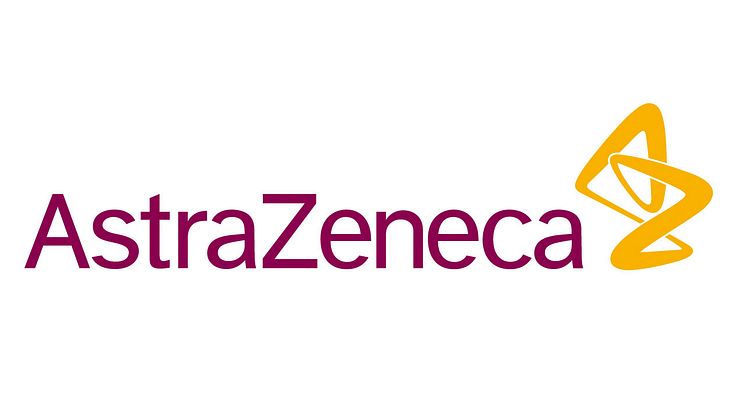
Pressmeddelande -
Lynparza approved in the EU for BRCA-mutated metastatic pancreatic cancer
Only PARP inhibitor approved in this disease
AstraZeneca and MSD Inc., Kenilworth, N.J., US (MSD: known as Merck & Co., Inc. inside the US and Canada) today announced that Lynparza (olaparib) has been approved in the European Union (EU) for patients with germline BRCA-mutated (gBRCAm) metastatic pancreatic cancer.
Pancreatic cancer is a rare, life-threatening disease with the lowest survival rate among the most common cancers.1 Approximately 5-7% of patients with metastatic pancreatic cancer have a germline BRCA mutation.2
The approval by the European Commission was based on results from the Phase III POLO trial, which were published in The New England Journal of Medicine. It follows the recommendation for approval by the Committee for Medicinal Products for Human Use of the European Medicines Agency.
Hedy L. Kindler, Co-Principal Investigator of the POLO trial and Professor of Medicine, University of Chicago Medicine, said: “Today’s approval opens the door to a new era of biomarker-led care for patients with metastatic pancreatic cancer in the EU, which has the highest incidence of any region globally. Lynparza now provides clinicians with a targeted, well-tolerated treatment option for patients with germline BRCA-mutated metastatic pancreatic cancer.”
Dave Fredrickson, Executive Vice President, Oncology Business Unit, said: “Patients with metastatic pancreatic cancer historically have faced poor outcomes due to the aggressive nature of the disease and few treatment advances have been made over the last few decades. In the POLO trial, Lynparza nearly doubled median progression-free survival versus placebo after 1st-line chemotherapy for patients with germline BRCA-mutated metastatic pancreatic cancer. This approval underscores the importance of testing all patients for germline BRCA mutations at the time of diagnosis, as it will help inform personalised treatment options for patients in the EU.”
Roy Baynes, Senior Vice President and Head of Global Clinical Development, Chief Medical Officer, MSD Research Laboratories, said: “MSD and AstraZeneca are committed to advancing research into the treatment of patients with challenging types of cancer, including those with metastatic pancreatic cancer. Lynparza is now the only approved PARP inhibitor in biomarker-selected patients with metastatic pancreatic cancer. We look forward to making this targeted treatment option available for patients across the EU as quickly as possible.”
The POLO trial demonstrated that Lynparza nearly doubled the time patients with gBRCAm metastatic pancreatic cancer lived without disease progression or death to a median of 7.4 months versus 3.8 months on placebo. The safety and tolerability profile of Lynparza in the trial was consistent with previous trials.
Lynparza is indicated as monotherapy for the maintenance treatment of adult patients with germline BRCA1/2 mutations who have metastatic adenocarcinoma of the pancreas and have not progressed after a minimum of 16 weeks of platinum treatment within a 1st-line chemotherapy regimen.
Lynparza is approved in the US and several other countries as a 1st-line maintenance treatment for patients with gBRCAm metastatic pancreatic cancer based on the Phase III POLO trial, with ongoing regulatory reviews in other regions.
Pancreatic cancer
Pancreatic cancer is a deadly cancer with a high unmet medical need. Globally, pancreatic cancer is the 11th-most commonly occurring cancer and the seventh leading cause of cancer death.3,4 There were approximately 460,000 new cases worldwide in 2018.1As there are often no symptoms, or symptoms may be non-specific in the early stages, it is most commonly diagnosed at an incurable stage.5,6
Around 80% of pancreatic cancer patients are diagnosed when the disease has metastasised, at which point average survival is less than a year.7 Despite advances, few improvements have been made in diagnosis and treatment in the past few decades.8 Current treatment is surgery (for which approximately only 10-20% of patients are eligible), chemotherapy and radiotherapy, highlighting a critical unmet medical need for more effective treatment options.9
POLO
POLO is a randomised, double-blinded, placebo-controlled, multi-centre Phase III trial of Lynparza tablets (300mg twice daily) as maintenance monotherapy versus placebo. The trial randomised 154 patients with gBRCAm metastatic pancreatic cancer whose disease had not progressed on 1st-line platinum-based chemotherapy. Patients were randomised (3:2) to receive Lynparza or placebo until disease progression. The primary endpoint was progression-free survival and key secondary endpoints included overall survival, time to second disease progression, overall response rate and health-related quality of life.
BRCA mutations
BRCA1 and BRCA2 (breast cancer susceptibility genes 1/2) are human genes that produce proteins responsible for repairing damaged DNA and play an important role in maintaining the genetic stability of cells. When either of these genes is mutated, or altered, such that its protein product either is not made or does not function correctly, DNA damage may not be repaired properly, and cells become unstable. As a result, cells are more likely to develop additional genetic alterations that can lead to cancer.
Lynparza
Lynparza (olaparib) is a first-in-class PARP inhibitor and the first targeted treatment to block DNA damage response (DDR) in cells/tumours harbouring a deficiency in homologous recombination repair, such as mutations in BRCA1 and/or BRCA2. Inhibition of PARP with Lynparza leads to the trapping of PARP bound to DNA single-strand breaks, stalling of replication forks, their collapse and the generation of DNA double-strand breaks and cancer cell death. Lynparza is being tested in a range of PARP-dependent tumour types with defects and dependencies in the DDR pathway.
Lynparza is currently approved in a number of countries, including those in the EU, for the maintenance treatment of platinum-sensitive relapsed ovarian cancer. It is approved in the US, the EU, Japan, China, and several other countries as 1st-line maintenance treatment of BRCA-mutated advanced ovarian cancer following response to platinum-based chemotherapy. It is also approved in the US as a 1st-line maintenance treatment with bevacizumab for patients with homologous recombination deficiency positive advanced ovarian cancer. Lynparza is approved in the US, Japan, and a number of other countries for gBRCAm, HER2-negative, metastatic breast cancer, previously treated with chemotherapy; in the EU, this includes locally advanced breast cancer. It is also approved in the US and several other countries for the treatment of gBRCAm metastatic pancreatic cancer. Lynparza is approved in the US for homologous recombination repair gene-mutated metastatic castration-resistant prostate cancer. Regulatory reviews are underway in several regions for ovarian, breast, pancreatic and prostate cancers.
Lynparza, which is being jointly developed and commercialised by AstraZeneca and MSD, has been used to treat over 30,000 patients worldwide. Lynparza has the broadest and most advanced clinical trial development programme of any PARP inhibitor, and AstraZeneca and MSD are working together to understand how it may affect multiple PARP-dependent tumours as a monotherapy and in combination across multiple cancer types. Lynparza is the foundation of AstraZeneca's industry-leading portfolio of potential new medicines targeting DDR mechanisms in cancer cells.
The AstraZeneca and MSD strategic oncology collaboration
In July 2017, AstraZeneca and Merck & Co., Inc., Kenilworth, NJ, US, known as MSD outside the US and Canada, announced a global strategic oncology collaboration to co-develop and co-commercialise Lynparza, the world’s first PARP inhibitor, and Koselugo (selumetinib), a MEK inhibitor, for multiple cancer types. Working together, the companies will develop Lynparza and Koselugo in combination with other potential new medicines and as monotherapies. Independently, the companies will develop Lynparza and Koselugo in combination with their respective PD-L1 and PD-1 medicines.
AstraZeneca in oncology
AstraZeneca has a deep-rooted heritage in oncology and offers a quickly growing portfolio of new medicines that has the potential to transform patients’ lives and the Company’s future. With six new medicines launched between 2014 and 2020, and a broad pipeline of small molecules and biologics in development, the Company is committed to advance oncology as a key growth driver for AstraZeneca focused on lung, ovarian, breast and blood cancers. In addition to AstraZeneca’s main capabilities, the Company is actively pursuing innovative partnerships and investment that accelerate the delivery of our strategy, as illustrated by the investment in Acerta Pharma in haematology.
By harnessing the power of four scientific platforms – Immuno-Oncology, Tumour Drivers and Resistance, DNA Damage Response and Antibody Drug Conjugates – and by championing the development of personalised combinations, AstraZeneca has the vision to redefine cancer treatment and, one day, eliminate cancer as a cause of death.
AstraZeneca
AstraZeneca (LSE/STO/NYSE: AZN) is a global, science-led biopharmaceutical company that focuses on the discovery, development and commercialisation of prescription medicines, primarily for the treatment of diseases in three therapy areas - Oncology, Cardiovascular, Renal & Metabolism, and Respiratory & Immunology. Based in Cambridge, UK, AstraZeneca operates in over 100 countries and its innovative medicines are used by millions of patients worldwide. Please visit astrazeneca.com and follow the Company on Twitter @AstraZeneca.
Contacts
For details on how to contact the Investor Relations Team, please click here. For Media contacts, click here
References
1. Pancreatic Cancer UK. Pancreatic cancer statistics. Available at: www.pancreaticcancer.org.uk/statistics/ [Accessed June 2020].
2. Golan et al. (2020). Geographic and Ethnic Heterogeneity of Germline BRCA1 or BRCA2 Mutation Prevalence Among Patients With Metastatic Pancreatic Cancer Screened for Entry Into the POLO Trial. Journal of Clinical Oncology 2020; 38(13): 1442-1454.
3. Bray et al. Global cancer statistics 2018: GLOBOCAN estimates of incidence and mortality worldwide for 36 cancers in 185 countries. World Journal of Oncology. 2018;68(6):394-424. doi: 10.3322/caac.21492.
4. World Health Organization. IARC. (2019). Estimated number of deaths in 2018, worldwide, both sexes, all ages. Website available here. [Accessed June 2020].
5. Signs and symptoms of pancreatic cancer. Available at: www.pancreaticcancer.org.uk/information-and-support/facts-about-pancreatic-cancer/signs-and-symptoms-of-pancreatic-cancer/ [Accessed June 2020].
6. DaVee (2018). Pancreatic cancer screening in high-risk individuals with germline genetic mutations. Gastrointestinal Endoscopy. 87(6), pp.1443-1450.
7. Azar et al. (2019). Treatment and survival rates of stage IV pancreatic cancer at VA hospitals: a nation-wide study. Journal of Gastrointestinal Oncology, 10(4), pp.703-711.
8. Sheahan et al. (2018). Targeted therapies in the management of locally advanced and metastatic pancreatic cancer: a systematic review. Oncotarget. 9(30): 21613-21627.
9. Stunt, A. (2016). Pancreatic cancer: GPs can help prognosis by identifying early signs. Guidelines in Practice. Available at: www.guidelinesinpractice.co.uk/cancer/pancreatic-cancer-gps-can-help-prognosis-by-identifying-early-signs/352855.article [Accessed June 2020].
Ämnen
Kategorier
Om AstraZeneca
AstraZeneca är ett globalt, innovationsdrivet bioläkemedelsföretag med fokus på forskning, utveckling och marknadsföring av receptbelagda läkemedel, primärt för behandling av sjukdomar inom tre huvudsakliga terapiområden: cancer, kardiovaskulära sjukdomar, njursjukdomar och metabola sjukdomar och sjukdomar i andningsvägarna. AstraZeneca bedriver verksamhet i över 100 länder och dess innovativa läkemedel används av miljontals patienter över hela världen.
Mer information finns på: www.astrazeneca.com och www.astrazeneca.se. Du kan även följa oss på twitter https://twitter.com/AstraZenecaSE


